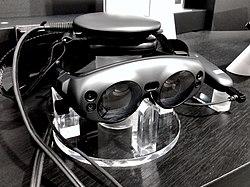
Financial Times has reported that tech giant Meta is in talks with Magic Leap, a startup specializing in augmented reality, to secure its AR tech amid CEO Mark Zuckerberg’s metaverse bid.
Sources familiar with the talks revealed that Meta was considering various options regarding its potential multiyear deal with Magic Leap. These include intellectual property licensing and contract manufacturing within North America to assist Meta in developing AR products for the mainstream market on a larger scale.
With Apple preparing to unveil its “mixed reality” device soon, Meta remains committed to augmented and virtual reality. Both companies are optimistic about the potential profitability of headsets, considering them as a new computing platform that can rival mobile devices.
Despite challenging macroeconomic conditions and a decline in advertising, Meta currently dominates the VR/AR headset market, accounting for approximately 80 percent of all sales. However, the market is relatively small, with less than 9 million units sold last year.
Per reports, investors are increasingly frustrated with Meta, thanks to Zuckerberg’s annual investment of $10 billion in the metaverse project, a venture that is expected to take several years to become profitable.
Magic Leap 2 is the result of our singular focus. It’s a platform that truly addresses the historical barriers that have long held back adoption of Augmented Reality (AR).
Peggy Johnson, Magic Leap CEO
Magic Leap’s headsets
Meta’s potential partnership with Magic Leap aligns with the growing pressure faced by Silicon Valley to reduce dependence on China for hardware manufacturing.
Established in 2010 and headquartered in Florida, Magic Leap is one of the leading AR startups, having gained considerable attention and secured over $3.5 billion in funding through multiple rounds with prominent investors such as Google, Alibaba and Qualcomm.
The company made a strategic shift after the Magic Leap 1 headset’s disappointing sales, which reached only a few thousand units. With 1,200 employees, Magic Leap shifted its focus from consumer markets toward enterprise applications.
In 2020, Magic Leap explored the possibility of a sale, which included discussions with Facebook that did not result in any concrete outcome. The following year, the company saw Saudi Arabia’s Public Investment Fund, a longstanding investor, acquire a controlling stake of more than 50 percent.
In a recent blog post titled “What’s Next for Magic Leap,” CEO Peggy Johnson hinted at a new source of revenue for the company. Johnson, who played a vital role in the launch of Magic Leap 2 in September, mentioned the significant interest the company had received from various industry players.
This revolves around licensing Magic Leap’s intellectual property and leveraging its patented manufacturing process to produce optics for others looking to introduce its mixed-reality technology.
In partnership with contract manufacturer Jabil, Magic Leap can assemble tens of thousands of headsets annually in its facility located in Mexico.
Speaking to Financial Times, the company highlighted the intricate nature of developing authentic AR technologies and the complexities of manufacturing optics. It also addressed the concerns regarding overseas supply chain dependencies.
As a result, the company has established several non-exclusive partnerships for intellectual property licensing and manufacturing to support companies in entering or expanding their presence in the AR market.
According to two former Magic Leap employees, the company’s most significant advantage lies in the advanced capabilities of its “waveguides,” which allow a thin glass material positioned in front of the user’s eyes to generate lifelike images at various depths.
